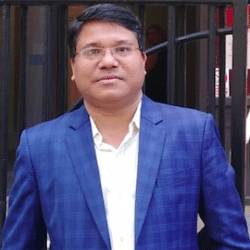Unleashing a more equal environment for development

Society often considers persons with disabilities in need of charity and welfare. Shifting this narrative towards one of regaining respect and agency to make a positive contribution to society is crucial for sustainable development.
The Co-Founder of Access Bangladesh Foundation and Ashoka Fellow, Albert Mollah, is addressing this need for systems change by integrating research, advocacy, and service to transform the development space into a more equal environment.
His approach aligns with the Dela programme’s aim of fostering empathy and compassion in order for corporations to become facilitators of positive change, influencing the outcome of an organization’s impact:
1. Decentralizing development
Albert’s organization is innovating ways to include persons with disabilities into all aspects of development planning. By de-centralizing development, Access Bangladesh is creating opportunities for more voices to be incorporated into the development agenda, focusing on shifting the environment to an ecosystem where people with disabilities can thrive.
2. Shifting roles & creating opportunities
With support from the Dela programme, Albert is achieving this aim by shifting the roles and opportunities of people with disabilities to be active and engaged members of society. His organization strives towards a rights-based approach, where people with disabilities can receive the respect, dignity, and right to agency that they deserve.
3. Catalysing policy change
“My organization is actively working for the policy changes activities, so I was oriented with a system change strategy, but the Dela programme has helped me to deep-dive into this process”.
Albert works with the Government, Non-Government Organizations (NGOs) and Organizations of Persons with Disabilities (OPDs) to shift their focus on persons with disabilities, which includes working to influence areas such as education, health and infrastructure to better suit people’s needs and abilities. He utilizes the UN’s Sustainable Development Goals (SDGs) to help guide his vision for a more equal development.
Using compelling data as leverage points
An immediate outcome from his participation in the Dela global accelerator has been fleshing out concrete changes in specific census that will help make reliable and comparable disaggregated data about persons with disabilities in Bangladesh available and inform employment related policies programmes and budget allocation.
Ultimately, more meaningful and useful data on persons with disabilities provides accurate reflections of people’s employment needs and how to implement the necessary changes and opportunities.
Neetu Kapasi, the IKEA co-worker who joined Dela to work with Albert, also shares her insights from the programme:
“Working as a strategy partner in the Dela Programme, supporting social entrepreneurs has been a life-changing experience. So much so, that it inspired me to focus on Equality, Diversity and Inclusion at academic level research plus change the course of my career to explore work opportunities where I can enable societal change. Journey with Albert and his team, impacting strategies to support development of his initiatives, find innovative solutions to enable disabled people enter the workforce and improve the lives of vulnerable and marginalized people, has taught me compassion, power of collaboration, how each one of us can be a change agent, and sincerity of efforts when you want to make a difference.”
The Dela Programme’s role in promoting social entrepreneurship also requires the ability to learn, influence, contribute and support positive change. These are aspects of Albert’s organization that the Dela Accelerator was able to support and nurture, strengthening the impact of his organization and making data on persons with disabilities more visible and accessible.
There is a need for more evidence-based research for advocacy and policy-making rather than conventional or generalized approaches that do not go beyond the welfare delivery stage. After the Dela Accelerator, Albert is now fully able to focus on the systematic impact of his work. The programme helped him to go in detail about the systemic work he is already doing.
The value of co-creation for social entrepreneurs, co-workers and corporate partners
Albert Mollah and Neetu Kapasi also participated in the 2021 Ashoka Changemaker Summit, showcasing the value of co-creation for social entrepreneurs, co-workers and corporate partners in order to lead towards long-lasting impact. Listen to their experience, insights and learnings after going through the Dela Accelerator:
